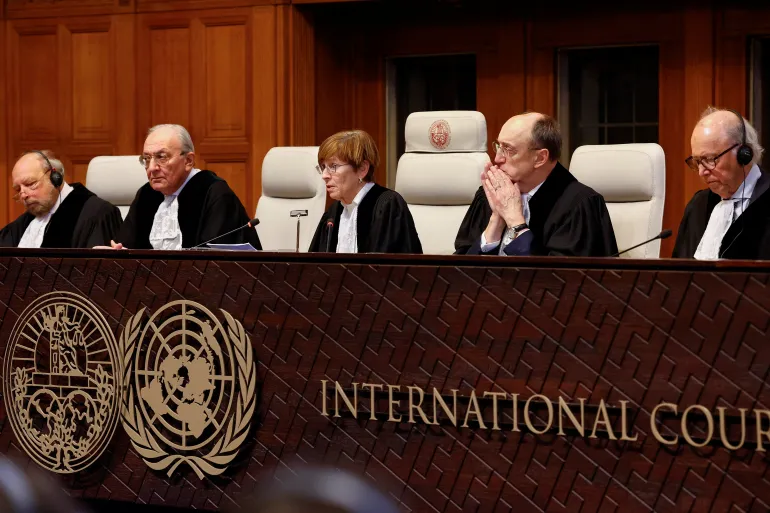
ICJ delivers judgement on Jurisdiction and Preliminary Objections in Ukraine v. Russian Federation Case
By Staff Writer.
The United Nations International Court of Justice delivered its judgement in the Ukraine v. Russian Federation Case on the matters of jurisdiction and preliminary objections on February 2 in Hague.
On February 26, 2022, Ukraine filed in the Court an Application instituting
proceedings against the Russian Federation concerning “a dispute . . . relating to the interpretation, application and fulfilment of the 1948 Convention on the Prevention and Punishment of the Crime of Genocide” (Genocide Convention), which revolves around allegations of genocide and the use of force by the Russian Federation against Ukraine.
In its Application, Ukraine sought to found the Court’s jurisdiction on Article 36,
paragraph 1, of the Statute of the Court and on Article IX of the Genocide Convention.
Together with the Application, Ukraine submitted a Request for the indication of provisional measures, referring to Article 41 of the Statute and to Articles 73, 74 and 75 of the Rules of Court.

In paragraph 178 of its Memorial, Ukraine requested the Court to adjudge and declare that the Russian Federation’s use of force in and against Ukraine constituted a breach of its obligations under the Convention on the Prevention and Punishment of the Crime of Genocide. The Court, by a vote of 15 to 1, found that it had jurisdiction to entertain this submission based on Article IX of the Convention.
The Russian Federation raised several preliminary objections in the case. Firstly, it argued that Ukraine had inappropriately changed the substance of its claim in the Memorial compared to the claim raised in the Application. The Court, however, found that a dispute did exist between the parties on the subject matter of the Application.
Secondly, the Russian Federation contended that Ukraine’s submissions in paragraph 178, subparagraphs (c) and (d) of its Memorial, were inadmissible as they allegedly constituted an abuse of process. The Court rejected this objection, stating that these submissions were admissible and fell within its jurisdiction.
The third preliminary objection raised by the Russian Federation was that Ukraine’s claim in the Memorial was manifestly different from the one advanced in the Application. The Court disagreed, stating that the claims made in the Memorial were not manifestly different and were admissible.
The fourth preliminary objection raised by the Russian Federation was that Ukraine’s “reverse compliance request” was incompatible with the judicial function of the Court. The Court did not address this objection directly but noted that Ukraine sought a negative finding, while Libya in a previous case sought proof of a positive fact.
The Court found that Ukraine’s submissions in paragraph 178, subparagraphs (c) and (d) of its Memorial, were admissible and rejected the Russian Federation’s preliminary objections. It concluded that a dispute existed between the parties and that it had jurisdiction to entertain the second aspect of the dispute based on Ukraine’s submission.
Submission (b) in paragraph 178 of Ukraine’s Memorial pertains to Ukraine’s request for a declaration that it did not breach its obligations under the convention. However, the court determined that submission (b) did not fall within its jurisdiction.
Ukraine’s Memorial contained submissions (c) and (d) in paragraph 178, which requested the court to adjudge and declare that Russia’s use of force in and against Ukraine constituted a breach of the convention. The court deemed these submissions admissible, rejecting the third preliminary objection raised by the Russian Federation.
The court noted a shift in Ukraine’s submissions from seeking a confirmation that no acts of genocide were committed to absolving itself of responsibility for such acts. This change in purpose led the court to conclude that submissions (c) and (d) in paragraph 178 of Ukraine’s Memorial fell within its jurisdiction.
The case will now proceed to assess whether Ukraine committed genocide in the eastern parts of the country, as Russia claims, which the court ruoed that it has jurisdiction.
Russian President Vladimir Putin ordered the invasion on February 24, 2022, partly arguing that pro-Russian people in eastern Ukraine had been “subjected to bullying and genocide by the Kyiv regime”
Ukraine filed the instant suit at the ICJ, “emphatically denying” this and argument. They argued that Russia’s claim of “genocide” as a pretext for invasion went against the Genocide Convention.
The ICJ ruled in the judgement, read out by its president, Joan Donoghue on Friday that,
“ [i]n the present case, even if the Russian Federation had, in bad faith, alleged that Ukraine committed genocide and taken certain measures against it under such a pretext, which the respondent [Ukraine] contends, this would not in itself constitute a violation of obligations” under the genocide convention.

